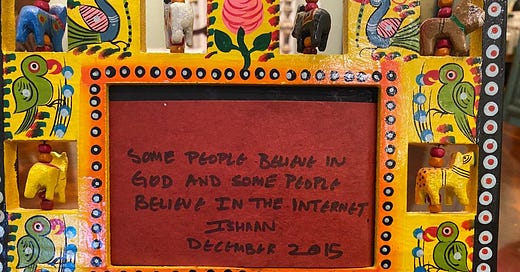Hello Global Jigsawers,
Como estais? I just got my booster jab on Sunday. I’m still COVID-free although it increasingly feels like a matter of time before I get it, given I’m pretty much the last woman standing amongst my friends at this point.
This week’s post is about the Internet’s erosion of parental authority: a global topic, if there ever was one. Please share, and if possible, switch to becoming a paid subscriber. It’s the equivalent of buying me a monthly coffee :-)
There is a framed quotation on display in my drawing room at home. The person being quoted isn’t among the usual suspects. He is in fact as far from someone like Mahatma Gandhi in comportment, as a sippy cup is from a champagne flute. It is my older son, Ishaan, and the quote is from December 2015, when he was 7 years old.
“Some people believe in God and some people believe in the Internet,” it reads. To know Ishaan is to know straight off the bat which side of this equation he leans towards. My son is a google-ist above all other faiths.
Since he learned to speak, my eldest has been riddling me with questions. “Where does God poop?”?” “What’s the third tallest peak in India?” “How do you say ‘grumpy’ in Latin?” “What’s the capital of South Sandwich Island?”
For years, my parental knowledge has been tested and shown up as shockingly lacking by Google. I am almost inevitably wrong when asked about Greek mythology, mathematical formulae, basketball statistics and astronomical phenomena: the stuff that forms the weft and weave of my kids’ thoughts.
An inescapable result is an erosion of parental authority. Much of the respect we held for our own parents when we were children came from their superior knowledge and hence their presumed understanding of things. In my time, a child’s access to the World was largely mediated by her progenitors. We relied on them to reveal to us, in a manner that they controlled, the secrets of life out there.
The Internet, as Ishaan so precociously pointed out, has been a watershed. For centuries people, not just children, relied on religious scriptures for information and understanding. Now they turn to search engines. All of which makes my seven-year old’s utterings worthy of being framed. Ishaan had grasped the sacredness of the Internet early on.
****
In fact, I’d had my own “Google vs parent” face-off when Ishaan was an infant. Much of what my mother had advised me to do at the time: to give the baby formula when I found it difficult to make enough breastmilk; to put him on his stomach to sleep better - was directly contradicted by the Internet.
Google had informed me that there was no such thing as the inability of a mother to produce sufficient breastmilk. She just needed to try harder by feeding round the clock, if necessary. And putting a child to sleep on its stomach was equivalent to committing murder, given the risk of SIDS (sudden infant death syndrome).
With hindsight, which is always 20/20, my mother was both right and wrong, as was the Internet. They were simply operating within different epistemes. Neither their concerns, not their ultimate goals were equivalent.
The Internet provided bald information. It doled this out to those who knew what questions to ask with a certain degree of accuracy and up-to-dateness. But it gave it to you without knowing you. It would give you the same facts regardless of whether you were the Maharani of Jodhpur or a foreign correspondent struggling to keep up with both babies and bylines in a foreign land. It did not contextualize. Google did not squeeze your hand. The computer screen did not take your baby from you at the very moment you needed a break most.
What my mother could provide was comfort, touch, empathy, and a knowledge of me as a person that went as deep as the Internet’s ‘knowledge’ was wide. She knew that the concepts of perfect parenting that I’d gleaned from the webpages I obsessively scrolled through, were oxymorons. For as all parents know, bringing up children is one long episode in making mistakes. Being a mother, is to fail. Being a successful mother is first and foremost about being kind to oneself. And to pass that kindness on to the children.
Google might have rendered us parents obsolete in some ways. The Internet can answer the most random of any child’s queries within a moment or two. It can inform them accurately and entertain them endlessly. But it is only their mothers and fathers who can teach them kindness. We should hold on to that and make it the centerpiece of our parental legacies. Our kids will thank us for it one day.
It is desirable for our children to be successful. It is a bonus if they are wealthy. But in my book, the only imperative is that they be kind. Take that Google!
Hasta pronto,
xo
Pallavi
Note: This piece was first published for a parenting column I write called, My Family and other Globalizers, for https://www.moneycontrol.com




